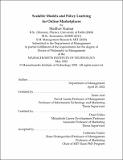| dc.description.abstract | This dissertation contains three essays on designing scalable models and policy learning methods for online marketplaces. The underlying theme across all chapters is the development of data-driven practical solutions that help improve business operations and customer experiences in e-commerce.
The first chapter offers a new perspective on creating promotional bundles in cross-category retail. A scalable approach is designed that efficiently leverages historical purchases and consideration sets to learn heuristics for complementarity and substitutability using machine learning-based embeddings. Subsequently, thousands of candidate bundles are created based on these heuristics and their effectiveness is tested using a field experiment. Offline policy learning is applied to the experimental data to optimize the retailer’s bundle design policy. The optimized policy is robust across product categories, generalizes well to the retailer's entire assortment, and provides an expected improvement of 35% in revenue over the baseline policy.
The second chapter investigates the impact of algorithmic pricing on consumer behavior. The adoption of algorithmic pricing by an online retailer led to considerably higher price volatility. Analysis of detailed clickstream data, complemented with lab experiments, suggests that consumers become more price sensitive when exposed to frequently changing prices caused by algorithms. Furthermore, it shows that a key mechanism driving this behavior is price salience. This finding is economically consequential because even if implementing algorithmic pricing is profitable, it triggers unintended side effects that modify consumer behavior in ways that undermine those gains.
The third chapter augments choice models and recommendation systems with consumer consideration sets. Recommendations systems are commonly used in online marketplaces to suggest relevant items (products in case of e-commerce, content in case of social media, and music/movies in case of entertainment platforms) to users. In the case of online retail, these systems typically use historical purchases to learn consumer preferences and then predict what consumers are likely to buy next. The suggested method enhances the learning of consumer preferences by flexibly incorporating consumers' historical consideration sets along with purchases with a sequential deep learning model. The search augmented recommendation system better captures consumers’ latent preferences, more accurately predicts future actions, and substantially outperforms strong baselines. Finally, we show that these gains are distributed across the entire spectrum of consumers and not concentrated among a small subset of high usage consumers. | |

